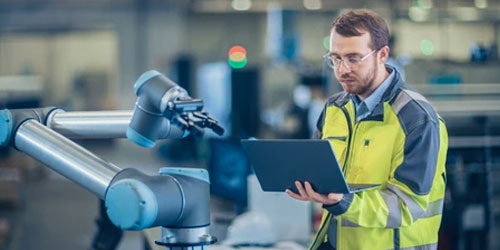The Digital Backbone: How AI and Automation Are Reshaping Manufacturing Supply Chains
Publish Date: May 8, 2024A report by the World Economic Forum predicted that 73% of material handling within warehouses would be automated by 2025
AI and automation, the twin titans, are at the forefront of driving the next industrial revolution, profoundly redefining manufacturing supply chains. The adoption of these technologies is not a futuristic vision but a present reality, with tangible benefits already being realized across the globe.
Manufacturing, a sector once characterized by manual labor and linear processes, is now at the forefront of digital transformation, tackling age-old challenges with cutting-edge solutions. The challenge of meeting ever-increasing customer expectations amidst global complexities is pushing the industry towards a tipping point where AI and automation are not just advantageous but essential.
AI: The Smart Brain
AI has transitioned from a supportive to a pivotal role in manufacturing. Its exceptional data analysis, trend prediction, and decision-making capabilities grant businesses an edge like never before. AI enhances decision-making, ensuring precision, speed, and cost-effectiveness, from demand forecasting to resource management.
Automation: The Strong Arm, the Pillar of Productivity
Automation has become essential, streamlining repetitive tasks to elevate human roles to more strategic and innovative activities. Automation has established itself as the backbone of productivity within the manufacturing realm. It has taken the lead in automating monotonous, labor-intensive tasks, thereby liberating the workforce to engage in more intricate and inventive activities.
AI and automation are not merely additions to the manufacturing landscape; they are its reinventors. These technologies promise to overhaul every aspect of manufacturing, from anticipating market fluctuations to keeping the gears of production smoothly turning.
The Role of AI and Automation in Supply Chains
AI and automation are pillars of innovation, offering not just incremental improvements but transformative changes. AI, with its capacity for learning and adaptation, and automation, with its efficiency and reliability, combine to form a potent force for transformation.
For instance, through predictive maintenance, companies like General Electric are leveraging AI to predict and prevent machinery failures, reducing unplanned downtime by up to 20%. In inventory management, AI algorithms automate and optimize stock levels, with giants like Amazon significantly cutting down on excess inventory and preventing stockouts. Quality control has been revolutionized by AI, with BMW enhancing product quality and minimizing waste through real-time part inspections. AI also brings unprecedented transparency and efficiency to supply chain management, as evidenced by FedEx’s real-time package tracking, improving customer service and operational performance. Furthermore, in supplier relationship management, AI’s role in automating evaluations, as demonstrated by Apple, ensures supplier reliability and compliance, maintaining high standards across the board. These advancements underscore AI’s integral role in streamlining operations, improving quality, and driving efficiency in today’s competitive business landscape.
SAP AI and Automation for your Supply Chain:
SAP and Microsoft recently announced their plans to incorporate more AI technology into their enterprise manufacturing and supply chain platforms. SAP is also enhancing its manufacturing applications, namely SAP Digital Manufacturing, SAP Asset Performance Management, and SAP Field Service Management, with more AI capabilities. These new AI capabilities are expected to improve manufacturers’ operations and supply chains. SAP already has several AI tools at its disposal, which further strengthens its AI for supply chain tools.
SAP Business AI
SAP Business AI can integrate AI-driven insights, recommendations, and automation into supply chain solutions. SAP’s supply chain software has four main functions: supply chain planning, execution, collaboration, and coordination. The SAP Supply Chain Management (SCM) module manages supply chain operations such as procurement, inventory management, logistics planning, and production planning. SAP Integrated Business Planning for Supply Chain uses demand sensing, statistical modeling, and machine learning algorithms to make accurate forecasts.
SAP BTP:
SAP Business Technology Platform (SAP BTP) complements digital supply chain solutions from SAP and brings together analytics and artificial intelligence. Generative AI uses machine learning techniques to learn from and create new data, while conversational AI enables machines to understand and respond to human language in a human-like manner.
AI can revolutionize supply chain management through augmented efficiency, cost, and accuracy tools. AI-driven visual inspection by computer into production processes can enable a remarkable increase in quality through automation.
SAP AI and Automation are bringing significant advancements in efficiency, productivity, and agility to the supply chain. Here are key areas where SAP’s integration of AI and automation is redefining manufacturing supply chains:
Predictive Maintenance: Through AI-powered predictive maintenance, SAP enables manufacturers to forecast equipment failures and proactively schedule maintenance, minimizing downtime and optimizing operational efficiency.
Demand Forecasting and Inventory Optimization: SAP’s AI capabilities allow for accurate demand forecasting and inventory optimization, leading to reduced stockouts, minimized excess inventory, and improved responsiveness to market fluctuations.
Intelligent Procurement and Supplier Management: By leveraging AI, SAP can streamline procurement processes, assess supplier performance, and even predict potential supply chain disruptions, leading to more resilient and agile supply chains.
Smart Production Planning and Scheduling: Automation in production planning, scheduling, and execution helps optimize resource allocation, reduce lead times, and enhance production flexibility, enabling manufacturers to respond swiftly to changing customer demands.
Quality Control and Defect Detection: AI-driven quality control and defect detection systems integrated into SAP solutions aid in detecting anomalies, minimizing rework, and ensuring high product quality standards across the manufacturing process.
Supply Chain Visibility and Transparency: SAP’s AI and automation tools provide real-time visibility into the supply chain, enabling rapid decision-making, identifying potential bottlenecks, and facilitating end-to-end transparency across the manufacturing ecosystem.
The Road Ahead
Adopting AI and automation is no longer a matter of if but when. Companies that recognize this shift and invest in these technologies today will be the ones leading the way tomorrow.
YASH Technologies is a leading SAP partner and has become a major player in driving AI and automation-based transformation for businesses. Leveraging its profound expertise in SAP Supply Chain Management (SCM), SAP Extended Warehouse Management (EWM), Business Technology Platform (BTP), and Business AI, YASH empowers organizations to achieve operational excellence, efficiency, and agility within their supply chain and warehouse management processes. With YASH as a strategic partner, businesses can streamline their supply chain operations, optimize resource management, and drive innovation through the intelligent use of SAP solutions.


















